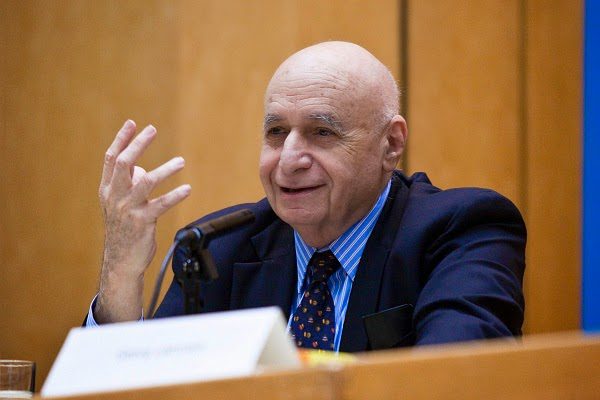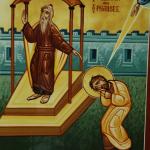Thirty-seven years ago, I stumbled upon an article by Peter Berger, “The Class Struggle in American Religion,” that gave me a new paradigm for understanding my times and that equipped me to resist some of the pressures I was feeling as a newly-minted English professor. In researching yesterday’s post, Status and Belief, on the “New Class,” I found Berger’s article on-line, so I wanted to draw your attention to it.
At the time, I recognized the author’s name because of his book Invitation to Sociology, which was a textbook in my Soc 101 class in college. I was curious why he was writing in Christian Century, a journal of mainline liberal Protestantism. Later, I realized that Berger was a Lutheran Christian of the ELCA variety and a giant in the field of sociology. He died last year. (See my post about him.)
Writing soon after the election of Ronald Reagan, Berger in the article discusses the relatively new “Christian right” and also the comparable political activity of the Christian left, as expressed in the National Council of Churches and other organs of mainline liberal Protestantism, which were still somewhat relevant four decades ago. He argues that those two different kinds of political activism on the part of churches–indeed, the whole “culture war” that was brewing then, which would reach unthinkable heights today–have to do with a “class struggle” between the “Business Class” and the new “Knowledge Class.”
From Peter Berger, The Class Struggle in American Religion: Christian Century, February 25, 1981, pp. 194-199:
This class struggle. . . is not the one that Marxists still fantasy about, proletariat pitted against bourgeoisie, the wretched of the earth rising against their oppressors. Rather, it is a struggle between two elites. On the one side is the old elite of business enterprise, on the other side a new elite composed of those whose livelihood derives from the manipulation of symbols — intellectuals, educators, media people, members of the “helping professions,” and a miscellany of planners and bureaucrats. This latter grouping has of late been called the “new class” in America — a not wholly felicitous term that is likely to stick for a while.
It is not possible here to discuss what some people, a little generously, have called the theory of the new class. But the main features of the theory are not difficult to grasp. In modern technological societies a diminishing proportion of the labor force is occupied in the production and distribution of material goods — that activity which was the economic base of the old capitalist class or bourgeoisie. Instead, an increasing number of people are occupied in the production and distribution of symbolic knowledge; these are the people enumerated above, and, if a class is defined by a particular relation to the means of production (as Marx, for one, proposed); then indeed there is here a new class. Like other classes, it is stratified within itself. And like other classes, it develops its own subculture.
The current class struggle is between the new knowledge class and the old business class. As in all class struggles, this one is over power and privilege. The new class is a rising class, with its own very specific (and identifiable) vested interests. But, in the public rhetoric of democracy, vested interests are typically couched in terms of the general welfare. In this, the new class is no different from its current adversary. Just as the business class sincerely believed (presumably still believes) that what is good for business is good for America, the new class believes that its own interests are identical with the “public interest.” It so happens that many of the vested interests of the new class depend on miscellaneous state interventions; indeed, a large portion of the new class is economically dependent an public-sector employment or subsidization.
Once this is seen, it comes as no surprise that the new class, if compared with the business class, is more “statist” in political orientation — or, in other words, is more on the “left.” Many if not most of the great liberal programs since the New Deal have served to enhance the power and privilege (not to mention the prestige) of the new class; not surprisingly, its members are devoted to these programs. . . .
Many if not most current political issues have a class component. Some of these issues are directly related to class interests. This, for example, is eminently the case with the issues raised by the environmentalist movement — a virtually pristine new-class affair, which has created a plethora of organizations devoted to the alleged protection of the environment, providing numerous jobs for members of the new class.
Other current political issues are not so directly linked to class interests. They have a more symbolic character, but the symbolism too has a class component. An example is the abortion issue. Attitudes on abortion divide sharply along class lines, with the new class in the vanguard of the pro-abortion movement. It is not altogether clear why this should be in the class interest of this particular stratum: but, for whatever historical reasons, the issue has attained a symbolic nexus with this stratum, so that members of the new class do indeed strongly tend to be in favor of abortion, while their class adversaries tend to be against it.
Other examples could readily be enumerated. The symbols of class culture are important. They allow people to “sniff out” who belongs and who does not; they provide easily applied criteria of “soundness.” Thus a young instructor applying for a job in an elite university is well advised to hide “unsound” views such as political allegiance to the right wing of the Republican party (perhaps even to the left wing), opposition to abortion or to other causes of the feminist movement, or a strong commitment to the virtues of the corporation. Conversely, a young business school graduate seeking a career with one of Fortune magazine’s “500” had better not advertise his or her career in the new politics, or views associated with the environmentalist, antinuclear or consumer movements.
Well, nearly 40 years later, someone interviewing with a Fortune 500 company might do better to parrot New Class liberalism, such has the “Knowledge Class” extended its influence. Today, even members of the Business Class, if they want prestige, will emulate the New Class, which has accelerated in status, thanks to the new “information economy” and the dominance of “information technology.” Now the information purveyors of the New Class have swallowed up much of the business realm, which is no longer a separate entity.
Berger goes on to say that the best way to monitor the beliefs of the New Class is to monitor the pronouncements of the National Council of Churches and the resolutions passed by the conventions of mainline Protestant churches. He says that the Christian right represents the interests of the Business Class, while the Christian left represents the interests of the New Class.
I think he overstates the economic interests of Christian conservatives, who are far more committed to moral interests, especially in issues such as abortion. But these do put them into conflict with the New Class.
Today, mainline Protestantism has declined to the point of irrelevance, while conservative Christianity has become low status, as far as the New Class is concerned.
I would just add that if you are aware of such social pressures, you can learn to ignore them. So that even if you belong to the “Knowledge Class, ” making your living by the “manipulation of symbols,” you can still pass through the eye of a needle and be a Christian.
Photo of Peter Berger by © Foto: Felix Grünschloss/ ZAK – Zentrum für Angewandte Kulturwissenschaft und Studium Generale des KIT – Karlsruher Institut für Technologie, Attribution, https://commons.wikimedia.org/w/index.php?curid=62367379












